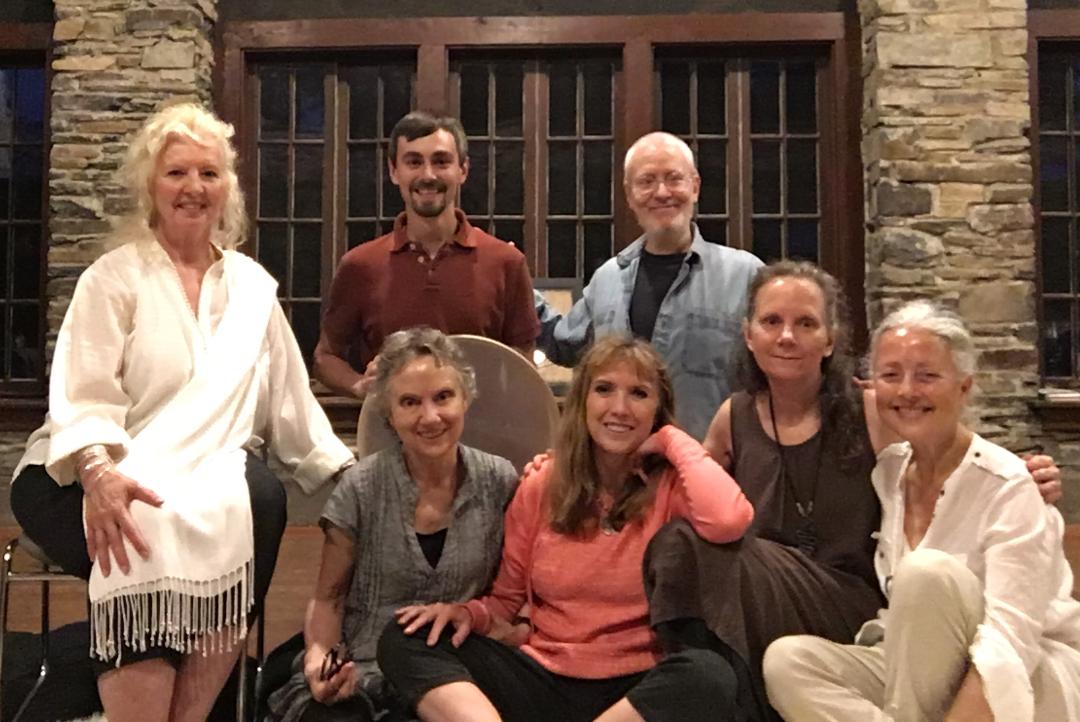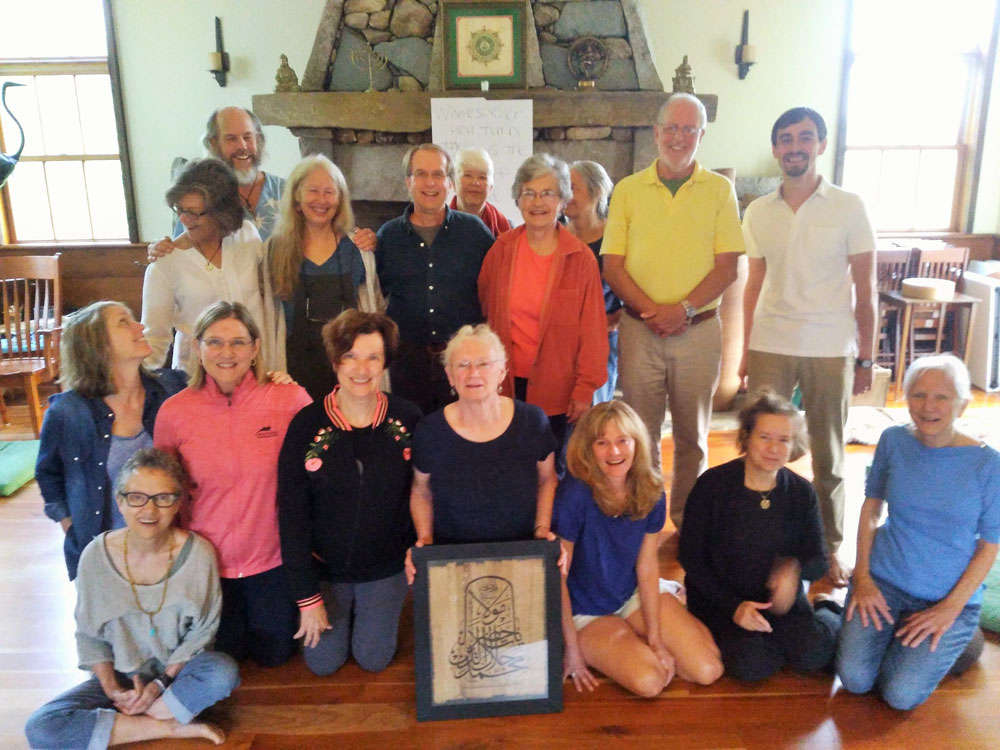 ~ by Matthew Wright [West Park, NY circle]
~ by Matthew Wright [West Park, NY circle]
I can only speak for myself, but I imagine that for all of us who have found (or been found by!) this Mevlevi Path, what I say here will ring true: finding the Way of Mevlana was like finding my heart given expression outside of my body. Finding these teachings was like finding my own deepest knowing put into words. Finding this path was like finding home.
For those of us who have found this Way, it’s a treasure we would trade for nothing. And yet a treasure like this is meant to be shared, not hoarded or hidden. How many more might benefit from the gifts of this path, if it were made accessible to them? Such sharing, however, is not always an easy or straightforward task, as the times (and places and cultures) we live in present unique challenges to transmitting the Mevlevi Path today.
I imagine that the work of human transformation has not much changed over the centuries—but the conditions in which we live out that transformation have. In times past, perhaps, a seeker was born into, and lived and died in, a single village and a single religion. In that context, certain questions and concerns simply never arose. Today, however, we live in a global context, faced with pressing issues like climate change; we are interconnected as a species through social media and travel like never before; we are confronted with religious diversity, pluralism, and the reality of a growing “Spiritual but Not Religious” population; and all the while the pacing of life seems to be moving faster and faster.
I believe our Mevlevi Path is primed to meet the needs of these times: to offer a vision that transcends dogmatic sectarianism; that is holistic and fully capable of embracing the unified ecological vision called for by our present crises; and that can transmit a science of human transformation and spiritual awakening that is our primary and most urgent need. But how do we hold the door to our tradition open wide, while also preserving the integrity of what we’ve been given?
Kabir Dede and Camille Ana have spoken about the way they felt they’d stepped into a fairytale when this Way opened to them—and that looking back on those early days, they see now they were experiencing the end of an era: the last days of Ottoman Sufism. The seeds they’d been given had to be planted in a new era, in new soil. The result is all of us! How can we as a Threshold community best serve and continue this ongoing work?
This is a question I’ve sat with over the years since Ana and Dede invited me through this door, and it’s become more pressing for me since leading a retreat on Sufism last year and then beginning to hold a local Threshold circle this past February. We’re a small group; most weeks we have eight participants who gather for zhikr, ilahis, hearing and reflecting on Mevlana’s poetry, praying salaat, and studying Dede’s The Knowing Heart. None of that group currently identifies as Muslim. I’ve wondered, Is this a problem? Are we engaged in an act of cultural appropriation?

I have gotten lost down rabbit holes around these questions—Must one become “Muslim” to truly walk this path? Is this work about taking on an “Islamic” religious identity? As some of you know, I serve as a Christian priest. I have wondered at times if, in order to truly honor our Mevlevi Way, I should leave the priesthood—or vice versa.
I have come to believe, however, that these are ultimately the wrong questions, rooted in a paradigm that humanity is rapidly outgrowing. Spirituality is not primarily about identities and boundaries, but practice and transformation. In that light, we can see the way of Muhammad (and the way of the Buddha, the way of Jesus, etc.) not as a sociological identity marker or religious boundary to be maintained (or worse, defended), but first and foremost as a path of awakening. Kabir Dede writes:
Islam, to some, is a collection of divine commands which must be obeyed, rituals that must be carefully observed in order to earn a high place in heaven. It has a certain look—one can dress more or less Islamically—and there are Muslim names. Some may even distinguish Sunni from Shia names. On the other hand there may be an Islam that is virtually invisible, free of identifying outer appearances.1
It is this invisible Islam that we Mevlevis are most concerned with, and to that end I find myself increasingly using the lowercase form of the word: islam, surrender to Divine Reality, and muslim, one living in (or striving towards) a surrendered state of being. With the capital letters gone, these are not identities or labels to be opposed to other such identities and labels, but simply transformation itself.
Scholars remind us that the revelation of the Qur’an initially constellated what we might today call a “radical interfaith movement”: a diverse group made up of former polytheists, Christians, Jews, and a category known as hanifs—unaffiliated monotheists or “seekers”—all united in a single body.2 Perhaps our Threshold circles—often made up of Muslims seeking a deeper way within their own tradition, Christians or Jews longing for a more mystical approach to faith and practice, and spiritual seekers who remain unaffiliated—look a lot more like the early Islamic movement than we realize.
The people drawn to the local circle I’m involved with are longing for an experience of God, of community, of love, of transformation. In framing our Mevlevi Way, I want to lower the boundaries to their having that experience, not set up obstacles to it. After a recent gathering that included a moving zhikr, I received these words from a participant: “I left feeling so warmly nourished… And the sweetness as we circled in on each other and just breathed and chanted—it broke some barriers that I’ve been maintaining and I felt so accepted.” Similarly, following a seated zhikr during a retreat this past year, a woman told me that even with decades of spiritual practice under her belt, she had never felt her heart so open as she did during the zhikr.

Such experiences are not uncommon for those who encounter our tradition for the first time, and I’ve come to believe that the practices we have received—with their warmth, embodied, vibratory, and non-discursive qualities—are particularly effective in opening hearts in our world. But for this to be the case, often certain intellectual and cultural obstacles must be removed—elements that we might think of as “Islamic,” but that I’ve increasingly come to see as cultural and not essential (gender segregation, head covering, a rigid understanding of religious identity, emphasis on fiqh, etc.). After all, this way of surrender, of islam, is the Way of Love, of which Mevlana writes:
Love is that ocean without boundary or shore
Where lovers drown without sigh or cryThat one who has tasted the wine of union with the supreme Soul
In his religion, the Ka’aba and idol-temple are oneThe sect of Love is different from all other religions
For lovers, their sect and religion is simply GodIn loving You there are certainly no Muslims
In the religion of Love, there is no infidelity or disbeliefLove’s religion is other than the seventy-two sects:
Beside it the throne of kings is just a floorboard.3
I believe this Way of Love is capable of speaking uniquely to the pluralistic (and often post-religious) world we live in—a world where traditional religious forms often seem to divide more than unite. In our times we do not need the propagation of religious identity markers so much as we need mature human beings.
On our Mevlevi path, growth in love—human maturation or completion—is our primary concern. It’s been said that when one enters this path, “If you are a Jew, you will become a completed Jew; if you are a Christian, you will become a completed Christian; and if you are a Muslim, you will become a completed Muslim.”4 When we shift from the note of conversion to that of completion, the door swings wide.
Again, in Kabir Dede’s words: “The Way of Mevlana includes many particularly beautiful and effective practices and customs that can be cultivated and preserved because they represent a very high level of human spiritual attainment in which wisdom and beauty were intermixed in ways that can lead to an increased capacity for love and the attainment of human maturity.”5
While this Way is grounded in the framework of historical Islam, our understanding of islam must never be small. As one of our lineage’s teachers, Malamati and Mevlevi shaikh Mehmet Selim Öziç, has said: “All human beings are members of the same family, that of Adam. Each of the world’s established religions is a partial expression of essential Islam. Thus ‘primordial religion’ [din al-fitra] directly informs the heart of humanity as a whole.”6
From this perspective, we can speak of an essential islam, understood as the din al-fitra—the primordial current of religion that appears wherever human beings appear—as well as the unique, cultural instantiations of that essential din, which include the formal religions. Similarly, Kabir Dede writes: “There has been a golden thread running through the centuries, the lineages of sincere seekers and inner tradition of conscious humanity… Christian mystics, Islamic Sufis, Zen Buddhists — all of these have been engaged in an empirical search, and have formed their own embodiments of that search.”7 That golden thread, we might say, is the din al-fitra, essential islam.
It’s in this light that I believe Mevlana invites us to understand the path brought by Muhammad—that it represents a flowering of the universal truths (the unity of God, the way of surrender, etc.) and practices (prostration, chanting, contemplation, ethical action, etc.) that lie at the heart of all authentic religion. By understanding our primary affiliation as a rooting in this essential islam—which embraces all of the great traditions—the Mevlevi path necessarily opens out to people of all (and no) religious backgrounds.
Again, in the words of Mehmet Selim: “The Sufi path must be opened to people of all religious perspectives, and the insights of this path should be shared with mystics of all other traditions: Jews, Christians, Hindus, Buddhists, Taoists, etc. It is imperative that the mystics of the world’s religions come together in dialogue in order to share the particular gifts given to their respective traditions.”8 Mehmet Selim Baba’s words speak to the times we live in, and to an emerging global culture of love and conscious interrelationship that we seek to support and further.
This broad and inclusive approach grows out of, and not in spite of, our Islamic heritage. To be clear, we trace our lineage chronologically and historically through Mevlana Jalaluddin Rumi and Shams of Tabriz all the way back to Imam Ali and the Prophet Muhammad (may divine peace and blessings embrace them all). But from another angle of vision, our lineage isn’t most truly found by simply moving backwards through time, but rather by moving more deeply into the now. From this perspective, we discover the prophets and pirs not only as figures of the past, but as living, imaginal realities and archetypes present within human consciousness. It is through this living chain or silsila, leading into the Love at our center, that we discover the true and ongoing source of our tradition.
This shift in perspective also changes the way we might ask certain questions—for example, not “What would Muhammad have done fourteen centuries ago?” (which could result in a dead and imitative legalism) but instead, “How would the prophetic archetype seek to manifest itself in this time, place, and culture?” When we make this adjustment, we liberate the Way of Mevlana—and are liberated by that Way—to serve the times we live in.
Kabir Dede has written that our work as Mevlevis today is “to offer an inclusive framework and practice with the explicit understanding that we seek to discover and embody the perennial wisdom in a form appropriate to humanity’s current level of cultural development.”9 And, we might add, in a form appropriate to the crises and conflicts we now face as a species. And this is happening! From The Living Tradition blog to the work of Rumi’s Circle in the UK (and beyond) to Camille Ana’s poetry pouring forth into published form—new forms of our community life and teaching are growing and flourishing, in new soil, for a new era.
Our Mevlevi tradition is meeting the times that we live in—and perhaps has even been particularly readied for them. The world needs nothing more now than La ilaha illallah—nothing more than the vision of total unity and the path of Love that we have received. And so, may the circles of lovers increase—and may we hold the door open wide.
~ Matthew Wright facilitates the Threshold West Park NY circle. More details here.
[1] “The Most Important Thing I Learned from my Murshid,” https://www.patheos.com/blogs/livingtradition/2017/03/important-thing-learned-murshid/
[2] see Muhammad and the Believers: At the Origins of Islam by Fred M. Donner
[3] These English translations, as well as the Persian originals, can be found at https://blogs.harvard.edu/sulaymanibnqiddees/2014/05/30/the-religion-of-love/
[4] Kabir Helminski, The Knowing Heart, p. 20
[5] E-mail correspondence, 6/12/17
[6] Yannis Toussulis, Sufism and the Way of Blame, p. 156; quotation abbreviated
[7] E-mail correspondence, 6/12/17
[8] Yannis Toussulis, Sufism and the Way of Blame, p. 158
[9] E-mail correspondence, 6/12/17

